I’m going to start this by admitting that this is the VERY first time that I’ve ever made my own chicken broth. I’ve been meaning to for years… and it’s almost hypocritical of me not to, but for some reason I never got around to trying it.
So, don’t read this post as a “definitive guide” to making chicken broth, but rather a “here is my experience, you should try it too!” Also, because I know there are A LOT of you who have been doing this for years, I’d love it if you’d share your tips, tricks, and experiences in the comments so that we can all learn from each other :)
So what was my experience? OMG, so easy. Seriously, dump it all in the pot and let it go. Come back later and you have a magical golden liquid full of flavor and good for you nutrients. Why wouldn’t you want to do this?! Plus, I always get warm and fuzzy inside when I know that I’ve reduced my waste. By making broth you get to use every last bit of goodness in your chicken and vegetable scraps. I can’t wait to make some vegetable broth too!
A couple good tips I’ve already gotten from readers:
1) Save your vegetable scraps from other recipes in the freezer until you’re ready to make broth. Just make sure they’re well washed first to remove sand and dirt.
2) Theresa suggested making the broth in a slow cooker instead of on the stove top for even less baby sitting. Let it go all night and you’ll have an ultra-amazing broth by morning!
I can’t wait to hear everyone else’s tips!
Homemade Chicken Broth
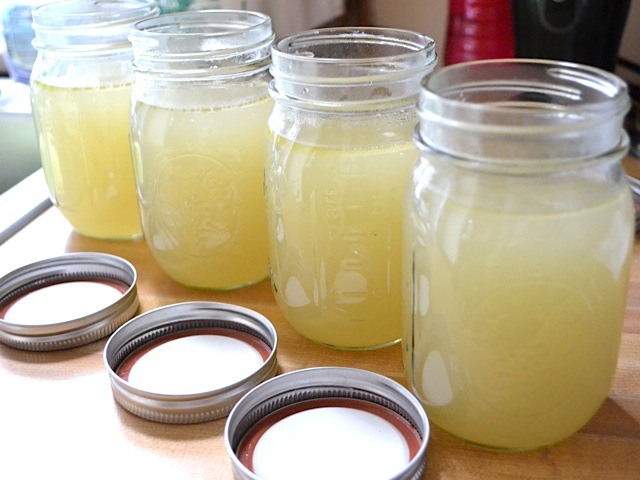
This post contains some affiliate links, which means that we make a small commission off items you purchase at no additional cost to you.
How to: make chicken broth
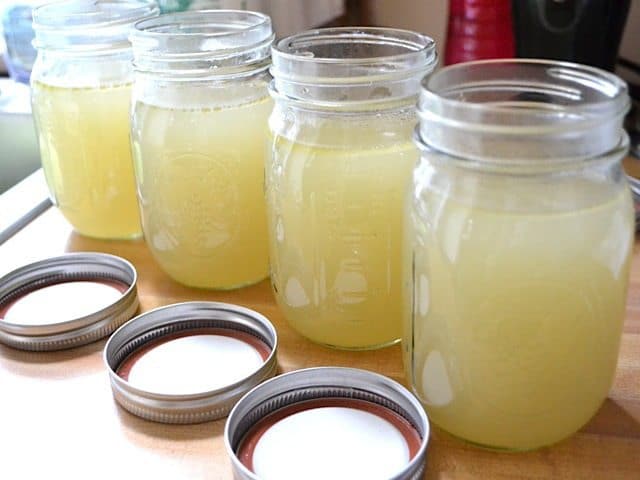
Ingredients
- vegetable scraps
- chicken carcass
Instructions
- Pick the skin from the chicken carcass and make sure you’ve gotten all of the good meat off. Leave the cartilage as this will “melt” into the broth, adding flavor and nutrients. Yes, cartilage has nutrients. It’s like taking a joint supplement pill, but it tastes better.
- Make sure your vegetable scraps are clean by rinsing well with cool water. You can use the ends and stems of carrots, celery, herbs, onion skins, or any piece of a vegetable that you normally cut off and throw away. The vegetables WILL effect the flavor, so make sure you use vegetables that “go” together. I used celery, carrots, parsley stems, and onion skins.
- Add the chicken carcass and vegetable scraps to a large pot and cover with water (about 12 cups, depending on how big your chicken was and how many scraps you have). Bring up to a boil over med-high heat, then reduce to low and let simmer with a lid for 3-4 hours.
- After simmering, pour the broth through a colander into a large bowl or pot. Remove the colander and throw away all of the scraps. Cover the colander with a cheese cloth or another clean, lint-free cloth and pour the broth through once more to remove small particles.
- Divide the broth into smaller containers to help facilitate cooling. Refrigerate until cold and then transfer to the freezer, remembering to label and date each container.
See how we calculate recipe costs here.
Notes
How to Make Chicken Broth – Step By Step Photos
So, I roasted a whole chicken in my slow cooker last weekend, and after it was cool enough to handle I picked the meat off and saved the bones and scraps until I was ready to make the broth.
The next day, after I had accumulated some vegetable scraps, I started the broth. First things first, make sure the vegetable scraps are CLEAN. Sand in broth is not good. I had celery tops and stems, carrot ends and peels, onion peels, and some parsley stems. Place them in a large pot along with your chicken carcass.
Cover the whole thing with fresh water. I used 12 cups. Bring the pot up to a boil over medium-high heat and then reduce it to low and let simmer (with a lid) for 3-4 hours.
After you’ve simmered all of the goodness out of your scraps, it’s time to strain out the magical golden liquid. Place a colander over a large bowl and pour the whole pot through it. Discard the collected scraps.
After the first strain, this is what I had. It’s already golden and beautiful. And it smells delightful too.
You’ll want to strain a second time through a fine weave, lint-free cloth to remove any small particles that may have passed through the colander. I just laid my cloth out over the colander and poured through again.
It didn’t catch much, but I bet if I had simmered for longer everything would have broken down more and there would be more small particles.
You can season your broth at this point with salt and pepper, but I prefer to leave it unsalted and then just add salt later when cooking with the broth. Adding salt at the end of a recipe allows you to use less and achieve the same flavor punch. Also, it’s always a good idea to divide your broth (or any food) into smaller containers before refrigerating so they cool down faster. Always chill the broth before placing it in the freezer.
I put my broth in jars because they were sitting there on my counter, but I like to freeze sauces and liquids in quart sized freezer bags. You can freeze in glass jars, but make sure to leave room for the liquid to expand as it freezes, or else your container will burst.


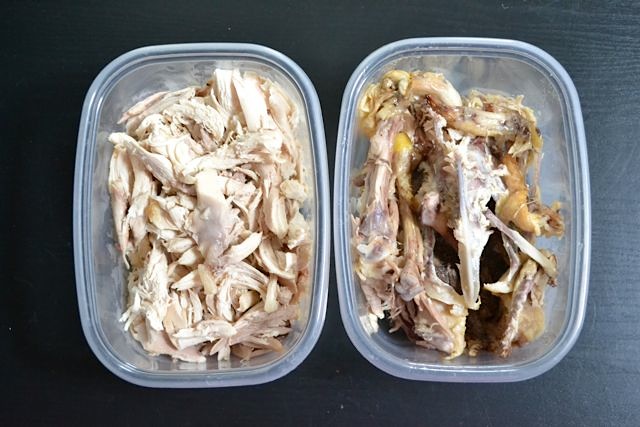
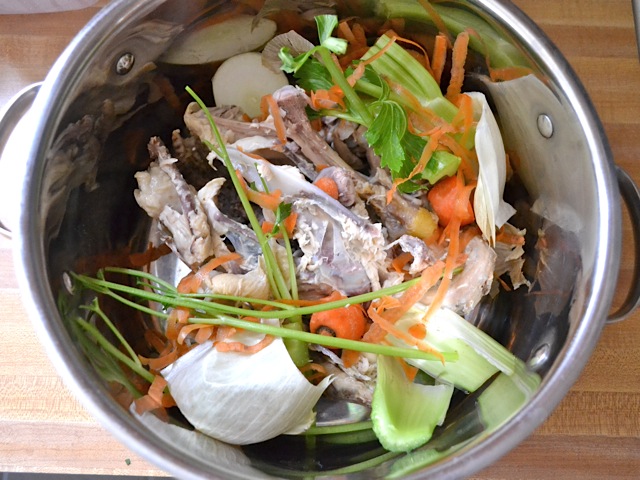
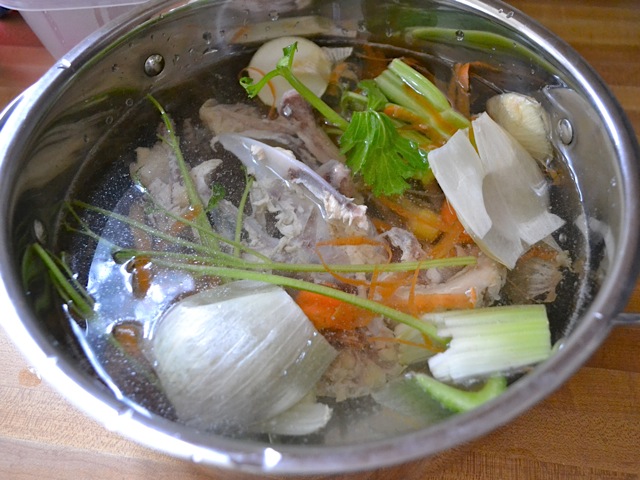
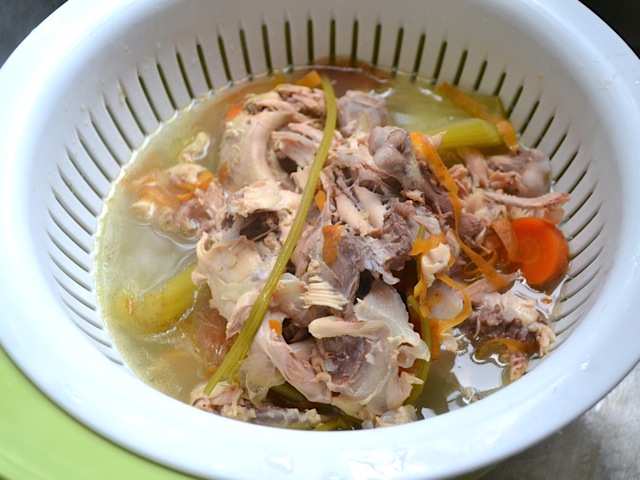
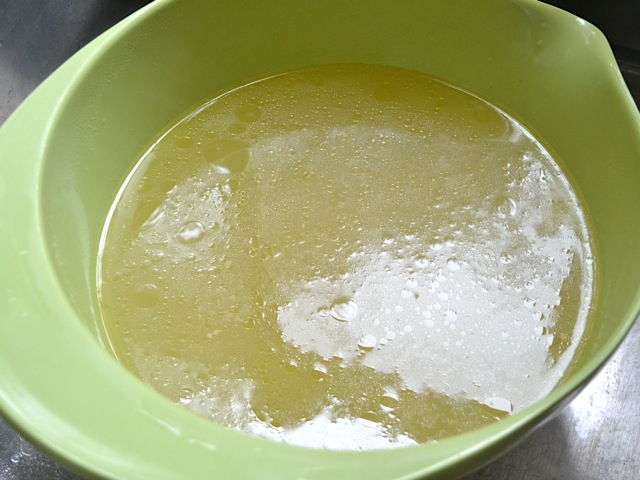



I make mine in the crockpot overnight. You can do the same thing with your turkey carcass after Thanksgiving. Chicken broth from scratch is good, but it doesn’t compare in flavor to turkey broth! And if you leave the skins on the onions when you make the broth, they give it a nice deep, golden color.
Manuel Neuer
This is very nice love this main!
This comment has been removed by the author.
I just want to add that I LOVE making this in the slow cooker. After you’ve cooked up the chicken, you can throw everything together in the slow cooker and let it cook on low over night (8-10) hours. Wake up in the morning, and you’re good to go!
For the person who asked about using a turkey – it’s exactly the same. I do this with the carcass every year after Thanksgiving :) Since I know that’s what I’ll be doing, I save all my veggie scraps from Thanksgiving meal prep, which is usually bits of carrots, celery, and onions. I add it all to the pot with a few bay leaves and some whole peppercorns and let it cook throughout Black Friday!
I’ve made stock on the cooktop, in a slow cooker, and in a pressure cooker. It doesn’t make a lot of difference — mostly depends on what other time demands I have.
Lots of mirepoix and any or all of parsley, sage, rosemary, and thyme work great. You don’t need to grind black pepper – just add the corns.
I find the chicken fat distasteful in stock. I work hard to get it all out.
Once it’s clear I process it for an hour in a pressure canner and it keeps nearly a year on the shelf.
Has anyone tried pressure cooking the jars of stock after they are done? I’d like to keep some in the freezer and some just on a shelf in my pantry. I’m wondering how long to process them…
Knowing how to make a great chicken broth is so valuable . Thanks for the tutorial! I too keep a stash of vegetables for stock hiding in the freezer–I usually just make straight-up vegetable broth with it, though.
Does anyone preserve their chicken broth in a pressure canner? I’ve been thinking that this might be a good idea at some point. (I just have to get a pressure canner and learn to use it, but then!)
Re JESSICA & turkey:
I use our turkey bones/carcass every Thanskgiving. It’s great. It has a stronger flavor and slightly different – like turkey is different than chicken.
Personally, I tend to use turkey broth IN recipes alone (rather than cups of broth or clear soups, like I also do with chicken).
Perhaps ‘cuz my mom’s from Germany, but we always added juniper berries (which I always have on hand for various other dishes) and bay leaves. To be a GREAT budget buy, get whole chickens and spend a morning chopping them up yourself: breasts into one freezer bag, legs/thighs in another, wings/backs onto freezer bags.
For chicken broth, I just plop the frozen chicken (literally peeling off the plastic bag) into the pot, top with tons of veggies (MUST have celery, or, even better, celeriac root), begin the broth.
If you’re not familiar with the seasoning named Maggi (in German; I’ve seen this same bottle lined up on shelves in so many languages I couldn’t keep up!), you should run out and try it now. NO – don’t drink it straight from the bottle (although EVERY kid I know has tried, myself included), but add it to your chicken broth. NOTHING makes a sick person feel better than a simple, delicious cup of hot broth seasoned with some Maggi.
I used to make a pot of broth every week for my family (6 quart). First quart gone immediately in mugs with Maggi, then the rest used in various ways (have a list of fast soups ready to make, like a quick veggie soup, egg drop soup, avgolomono — OMG this is easy and good.
Enjoy! Welcome to the house-smells-so-good group!
I throw in 5 pepper corns when making my stock.
I cook my carcasses down to stock and then put it in ice cube trays and freeze it. I keep a couple of bags of poultry, beef and pork stock on hand. It’s concentrated, flavorful and “free”. (Beef and pork is typically the liquid left over from a slow-cooker roast unless I use it all up making gravy!)
When I worked for a caterer a hundred years ago she advised that adding an apple into stock-making provided just a little hint of sweetness to balance out the flavors. Just wash the outside and cut into largish pieces. It will all be strained out anyway so no need to peel or core. Maybe remove the stem if it’s long. Same person also used to like to add dill, fresh or dried. Me? I love to add ginger, fresh or dried…but that’s taking it in a more Asian direction. I find it gives complexity to anything else I do with it without being obtrusive.
Another tip I learned at The Restaurant School in Philadelphia a very long time ago: a bit of acid will help break down the bones to extract more flavor. For chicken, go with lemon juice. For beef, use any tomato product. Not quite as good as roasting the bones as someone else mentioned but a whole lot faster and easier IMHO. Just throw in at the beginning. You won’t taste it at the end.
Trained Chef Miss Maura in Charlotte, NC
I have started making my own broth this past year. I LOVE IT! I was afraid I would mess it up – but there is really no way. I do use my slow cooker. I purchase a whole chicken and cook it, and debone it, then put the remaining parts in the crock pot and cook all night, strain and freeze. Makes awesome chicken and dumplins.
I’ve made stock with just the carcass, with chicken pieces or whole chickens. All are great. I’ve made it on the stove top and in a slow cooker. I keep the seasoning pretty simple: carrots, onions, celery, parsley and/or bay leaf, salt and pepper. Maybe a little garlic. I don’t want another flavor to overtake the chicken flavor. I don’t want to taste too many herbal flavors or vegetables.